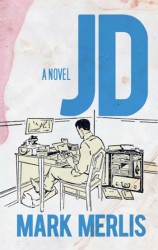 JD
JD
by Mark Merlis
Published by University of Wisconsin Press
Published March 24, 2015
Fiction
272 pgs. Find on Amazon.com • WorldCat
Reviewed by Stephen O. Murray
April 22, 2016.
Mark Merlis’s fourth novel returns to “the bad old days” (before gay liberation) of his first novel, American Studies.
Like American Studies, JD centers on a fictionalized version of a real-life literary figure, Paul Goodman (1911–72), a Jewish intellectual married to a woman but far more erotically interested in young males than in females of any age.
JD, an acronym for both “Juvenile Delinquent” and “James Dean,” the prototypical 1950s “rebel without a cause,” is an inquiry by Jonathan Ascher into the socialization of young men, similar to Goodman’s most famous book Growing Up Absurd (first published in 1960).
Jonathan has been thirty years dead and largely forgotten when his widow, Martha, receives a request from a would-be biographer to access Jonathan’s papers. She decides that she wants to look them over before reaching a decision and begins reading his journals, written only in even-numbered years: 1964, 1966, 1970, and 1972 (plus what turns out to be one entry from 1973 that is not filed with the others).
Martha is not particularly surprised to see in detail that her late husband was out cruising young men during his frequent and lengthy times away from her, particularly the summers in which she took their son, Mickey (1962–1973) to Jonathan’s brother’s summer place. Jonathan had found a lot of young men willing to have him suck their cocks, but none were willing to wake up with him, even once. Jonathan has lots of yearning but finds no love, not even short-term relationships, with the young men he yearns to connect with.
Martha is dismayed by the sordidness of tearoom and alley fellatios and even more dismayed by what Jonathan wrote about her and about his arousal by their adolescent son. Jonathan was himself dismayed by his erotic interest in his son and worried often and at length about what Mickey knew or suspected about his father’s sexual activities in general and incestuous desires in particular. The journals show that eventually father and son talked about it, though Jonathan was unable to explain to his son why he liked to suck cocks.
Like Goodman, Ascher had socialized with more joy-filled homosexual poets who died young: the real Frank O’Hara (1926–66) and the fictional reflection, Dennis O’Grady.
Much of the book is Jonathan’s journals from long ago, with some reactions by Martha along with her feelings both in the present and recollecting what she felt, what she knew, and what she didn’t know between 1964 and 1973, when an army major came to tell them that Mickey died in Vietnam.
I find her resentments about her husband and their son very credible. The two had smoked marijuana together often during his last year at home while he was flunking out of the university (a version of the New School in Manhattan) where Jonathan taught, having already flunked out of his mother’s family school (which I think is a fictionalized Dartmouth).
Jonathan is unhinged by his beloved son’s death, as Paul Goodman had been by the death of his son, Matthew. Neither survived long after their sons’ deaths (though Goodman continued writing in the five years after Matthew’s death in a mountain-climbing accident, and Jonathan did not after Mickey’s death in Vietnam; both Paul Goodman and Jonathan Ascher were outspoken critics of the U.S. military adventures in Vietnam). Mickey was and remained opaque, a cipher to both his parents (and to readers of the novel that has the perspectives of each but not the boy’s…or the boys’).
I also find her wry take on the would-be biographer, Philip Marks, who turns out not to be a graduate student seeking a dissertation subject but a tenured 50-year-old gay professor at a mediocre Delaware university, credible and entertaining. I also find Jonathan’s self-hating accounts of cocksucker abjection somewhat entertaining, though so frank and focused a diary strains my ability to suspend disbelief. Perhaps a tearoom queen with a wife and son to return to might have felt what Jonathan’s journal records, but the journals of gay (or, in the case of Jonathan, men who sucked off a lot of men and did not consider themselves “gay” and were unmoved by gay liberation that seemed to cut into the supply of young men sexually available to them) from that era that I have read are more telegraphic, with shorter less-detailed entries (and less self-analytic insight about sexual identity).
There is a lot of pain in JD, not only the brittle marriage of the Aschers and the early death of their son but also HIV+ Philip Marks’ from having lost a lover before protease inhibitors came along and saved his life. Plus Jonathan’s horror of being seen by anyone as a “fairy” (in contrast, Paul Goodman published The Politics of Being Queer in 1969, having publicly come out in his 1966 Five Years) and the painful realizations by Jonathan and Philip that they are not going to “make it” big-time as writers.
Philip believes he has another project in him (the biography/critical study of Jonathan Ascher) whereas Philip was feeling that he had ceased to be a writer. His 1964 journal musings led to JD, a book (like Growing Up Absurd) in which “you think he’s talking about finding a way for young people to live, and it’s all about remaking a world so that he still matters” (to the adolescent males he wanted to want him (p. 229)), but the Jonathan of the later journals knows that he is going nowhere else as a writer (no Compulsory Miseducation or New Reformation, later Paul Goodman social criticism that made smaller splashes than Growing Up Absurd had).
©2016 by Stephen O. Murray

